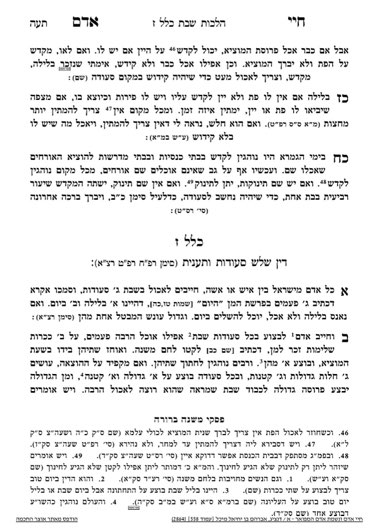The current series, which will cover seudos Shabbos and fasting on Shabbos, is available for sponsorship. Please contact Rabbi Reingold for more information.
We are beginning Klal 7, which discusses the seudos of Shabbos and when a person would be allowed to fast on Shabbos (such as a taanis chalom). These halachos are based in the Shulchan Aruch in siman 274 and 291 (seudos Shabbos), and siman 288 (fasting).
The Chayei Adam writes that every person is chayav to eat three seudos on Shabbos. Even though women are generally exempt from a mitzvos asei she’hazman grama (a time-bound positive mitzvah), and the seudos of Shabbos are time-bound (limited to Shabbos) and a positive mitzvah, they are still chayav. Regarding keeping Shabbos, the Torah uses both the words shamor and zachor, one referring to active participation in positive mitzvos, and the other referring to refraining from negative mitzvos. The Gemara learns a hekesh (connection) between these two words, and concludes that the same way women are chayav in keeping the negative mitzvos associated with Shabbos, they are chayav in the positive ones as well. This applies to all positive mitzvos of Shabbos, not just kiddush (zachor).
Chazal found a source for the idea of three seudos in the parshas hamon, where the word “hayom” is used three times. It is a machlokes whether this source creates a full-fledged chiyuv deoraysa, or just an asmachta (see more about asmachta in shiur S0062). The Rashba, in a teshuva, understands that it is a chiyuv deoraysa, and the Taz and Levush pasken in accordance with the Rashba. The Magen Avraham agrees as well, but also quotes the Rabbeinu Yonah who holds it is derabanan. The Abudraham quotes that they are derabanan in the name of Rabbeinu Tam.
At the beginning of siman 291, the Mishnah Berurah paskens in accordance with the opinion that seudos Shabbos are derabanan. Nevertheless, the Aruch Hashulchan writes that, although it is derabanan, it was instituted by Moshe Rabbeinu, and therefore is a strong chiyuv.
The Chayei Adam clarifies that the three seudos we are discussing refer to one at night and two during the day. One can fulfill all three during the day if they missed the first seudah at night. The Chayei Adam writes that the reward for eating the seudos Shabbos only applies if one eats all three. The Gemara says (Shabbos 118a) that a person who eats all three seudos on Shabbos will be saved from chevlei mashiach (birthpangs of mashiach), gehenom, and the war of Gog and Magog. The Gemara implies that without these three seudos, a person is at risk for these three struggles.
Thus, we see the significance of eating all three seudos on Shabbos. We will discuss further details in the upcoming shiur, be’ezras Hashem
Summary
- There is a chiyuv to eat three seudos on Shabbos. This chiyuv applies to men and women.
- Preferably, there should be one seudah at night and two during the day. However, one may be yotzei by having all three during the day.



